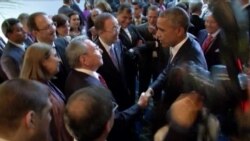The United States and Cuba reached a milestone in diplomatic relations Monday. The two countries formally upgraded their mission in the other's country from a special interests section to an embasssy, a move that is part of a series of recent steps to reset relations that soured more than 50 years ago.
The reopenings are a culmination of behind-the-scenes negotiations between the two countries. Those negotiations led to a public declaration by President Barack Obama in December that the U.S. would work to normalize relations with Cuba.
The change is partly a result of foreign pressure, said American University Cuba specialist William LeoGrande.
“The Latin Americans had really become fed up with this old anachronistic, Cold War policy, and they let the president know at the Sixth Summit of the Americans in Cartagena, Colombia, in 2012, and said they would not come to the next one if Cuba was not invited,” he said.
Changes underway
Workers have already removed the old sign from the Cuban Interests Section building in Washington. The new sign, designating the building as the Cuban Embassy, will be unveiled Monday.
According to Cuba’s Foreign Ministry, Monday’s ceremony will be led by Cuban Foreign Minister Bruno Rodriguez Parrilla. A delegation of high-level officials, including National Assembly members, are among those who will attend.
Roberta Jacobson, the assistant secretary of state for Western Hemisphere affairs, will lead a U.S. delegation. Jacobson played a pivotal role in talks to re-establish ties.
The formal reopening of the U.S. Embassy in Cuba will take place later when Secretary of State John Kerry travels to Havana. In a Friday briefing, a State Department official said the U.S. flag would not be raised at the Havana embassy until Kerry arrived, although the embassy would be fully functional.
However, early Monday, the Cuban flag will be added to a State Department hall featuring the other national flags. Later in the day, Kerry and Rodriguez Parrilla will meet at the State Department and speak to the media.
Talks continue
State Department spokesman John Kirby said the U.S. and Cuba continue to have discussions on a wide range of issues.
“We began a conversation that I suspect will continue on human rights, which we know is going to be a part of this new relationship,” said Kirby.
He also said the U.S. and Cuba had agreed to have conversations about fugitives and law enforcement.
The State Department official called Monday’s reopenings a “symbolic step,” but a very important step in the next stage of U.S. relations with Cuba.
The official said a tangible result of the changes is that more Americans would be able to travel to Cuba, and would do so with the support of the U.S. embassy. The official also said Cubans would have increased access to the U.S. embassy in Havana.
In the lead-up to plans to restore ties, the State Department removed Cuba from its State Sponsors of Terrorism list. U.S. officials said the move was separate from efforts to restore relations. However, the designation had been a major sore point for Havana.
Other restrictions under the U.S. trade embargo against Cuba will remain in place. A vote by Congress is required to lift the restrictions.
In a statement on the Cuban Foreign Ministry website, the Cuban government said the re-establishment of diplomatic ties and opening of embassies “completes the first stage of what will be a long and complex process toward the normalization of bilateral relations.”
The statement also said there could be no “normal” relations between the two countries “as long as the economic, commercial and financial blockage continues to be fully implemented, causing damage and scarcities to the Cuban people.”
However many Cubans have praised their government for enacting the changes and welcome the improved relations with the United States. Some have begun to sport clothing with the U.S. flag and other American symbols.
“The dam has broken,” said Marc Hanson, an associate for Cuba at the Washington Office on Latin America. “This has been tremendous. I don’t think that anybody expected that on December 17 when [Obama] made his remarks that this is where we would be only six to eight months in the future.”
Human rights in Cuba
But the warming of relations between the U.S. and Cuba is not without its critics. In a May hearing, Senator Marco Rubio of Florida, a Republican presidential hopeful, raised concern about whether there was enough focus on Cuba’s human rights record.
“Their view of human rights isn’t just different than ours, they are flat-out wrong and immoral in their views,” he said.
American Enterprise Institute analyst Roger Noriega, a former U.S. ambassador to the Organization of American States, also expressed concern about U.S.-Cuba engagement at a time when there are questions about Havana’s stance on human rights.
“I think we have had to lower our standards in order to raise our flag in Havana,” he said. “We are not defending human rights. We are not defending the very idea of representative democracy.”
U.S. officials have vowed to continue to raise questions about Cuba’s human rights record as well as other areas of concern.
American University's LeoGrande said he expected the warming of relations to result in a number of collaborative efforts between the U.S. and Cuba in the coming months. He said he expected the two countries to work more closely on issues including counternarcotics trafficking, law enforcement and the environment.





